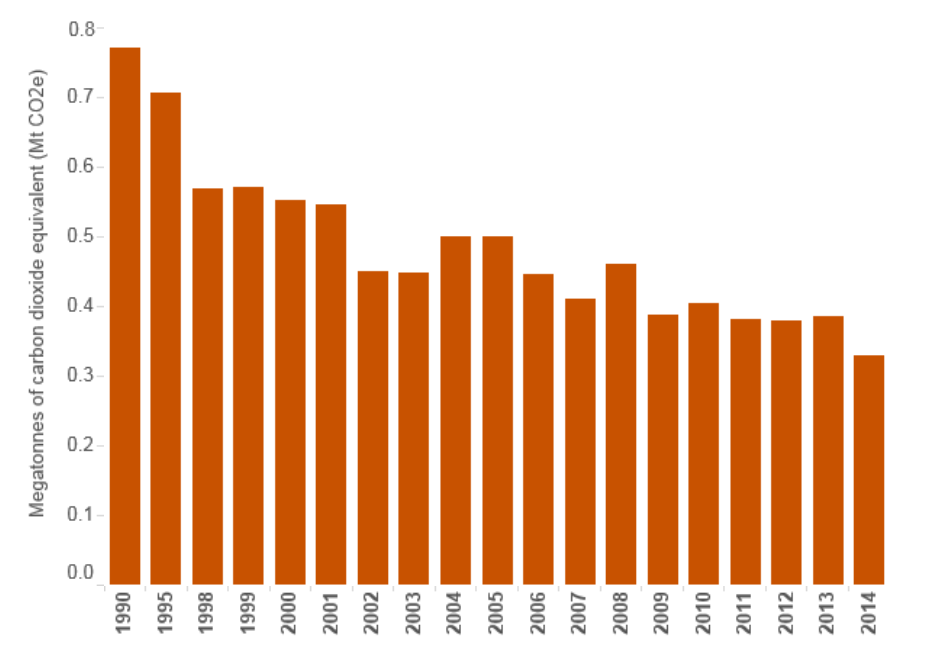On 27th June, there will be a Welsh Government plenary debate on Public Sector Decarbonisation. According to the latest statistics, published on the Welsh Government website at the end of May, the public sector was responsible for 0.71% of total emissions in Wales in 2014. Business accounted for 64.67%, transport for 12.77%, agriculture for 12.77%, the residential sector for 7.83% and waste 2.13%. Emissions from the public sector have been decreasing over time, and are currently at their lowest level since the 1990 baseline. Welsh Government attributes this decrease to improved energy efficiency measures, and a switch from more carbon intensive fuels (like coal and oil) to natural gas.
 Although the public sector accounts for the smallest share of emissions, the UK Committee on Climate Change (UKCCC) has highlighted that it has a critical role to play in demonstrating leadership on climate change action. In addition to reducing emissions from public sector buildings, the public sector has many more opportunities to influence emissions reduction; through procurement practices, through its leadership role, and through delivery of services.
Although the public sector accounts for the smallest share of emissions, the UK Committee on Climate Change (UKCCC) has highlighted that it has a critical role to play in demonstrating leadership on climate change action. In addition to reducing emissions from public sector buildings, the public sector has many more opportunities to influence emissions reduction; through procurement practices, through its leadership role, and through delivery of services.
The UKCCC has recently provided advice to Welsh Government on the way emissions should be accounted for in Wales. The advice, which is currently being considered by the Ministerial Decarbonisation Task and Finish Group and Cabinet, will be used to inform policy direction before summer recess 2017.
Policy and progress
The Climate Change Strategy for Wales (2010) sets the focus of Welsh Government action to accelerate climate change action in the public sector. It highlights five key areas:
- Supporting behaviour change across the public sector;
- Embedding climate change in Community Strategies through guidance and sharing of good practice;
- Reducing the carbon footprint of the Welsh Government estate;
- Reducing the carbon footprint of education and health services; and
- Delivering public sector buildings to higher standards of energy performance.
The strategy also sets out that, by 2020, Welsh Government expects to see the public sector leading the way on emission reduction, and greatly reduced energy use and emissions from the sector.
The Welsh Government published its 2015 Sustainable Development and Climate Change Annual Report in May 2016. The accompanying technical annex sets out a suite of indicators by sector, including the public sector, grouped under the policies set out in the Climate Change Strategy for Wales. Indicators were reported against using a traffic light system. Whilst overall public sector emissions are declining, the indicators highlighted a number of areas for improvement, namely:
- Public sector fuel consumption, where emissions remained below the baseline, but were stable;
- NHS greenhouse gas emissions, where there was insufficient data; and
- Education sector emissions (covered by the CRC Energy Efficiency scheme), where there had been clear deterioration.
In May 2017, the Cabinet Secretary for Environment and Rural Affairs, Lesley Griffiths, issued a written statement providing an update on the climate change provisions of the Environment (Wales) Act 2016. In relation to the public sector she stated:
As well as driving energy efficiency in the residential sector, I am also investing in the public sector, recognising it has a crucial role to play in decarbonisation through leadership, action and as enablers of change. The technical, commercial and financial support in place through Green Growth Wales will help support the decarbonisation of the public sectors building estate and has a pipeline with a capital expenditure of approximately £500m [...]
Over £24m of investment has been made in the last 2 years. This has led to projected undiscounted cost savings of over £72m and reductions in CO2 emissions of over 280,000 tonnes.
As a government we have previously highlighted the need for transparency around our emissions to understand where action needs to happen.
Work on reducing carbon emissions from the public estate includes the Natural Resources Wales (NRW) Carbon Positive Project. The project is an evaluation of the whole of NRW’s substantial estate, estimating its emissions and the carbon stored in habitats to evaluate the organisations net carbon status. The project aims to demonstrate that NRW are an exemplar in carbon management, and share best practice across the Welsh public sector. In addition to the evaluation it will:
- Investigate ambitious and innovative measures to reduce NRWs carbon impact, deliver projects to demonstrate measures and embed carbon management across NRW; and
- Plan future implementation to accelerate delivery of measures to help meet national and international carbon reduction targets.
- In its autumn 2016 project update (PDF, 731KB), NRW highlighted internal electricity and transport fuel use and the external procurement of goods and services as key areas for reducing its greenhouse gas impact.
Article by Chloe Corbyn and Sean Evans, National Assembly for Wales Research Service
Public sector emissions in Wales 1990-2014
Image from Flickr by Jeremy Segrott Licensed under Creative Commons.
This post is also available as a print-friendly PDF: Decarbonising the public sector in Wales – what next? (PDF, 225KB)





